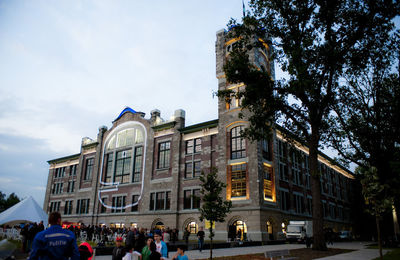
FROM KIS TO INSPIRATHOR FORMULA
View our services
Thor Park will be the very first rule-less zone in Flanders. The Flemish Parliament unanimously approved the decree on Wednesday 13 May 2020.
In addition to the restored mining building, the science and technology park also houses the IncubaThor office building, the T2 campus training center and the EnergyVille research buildings, the collaboration between KU Leuven, VITO, Imec and UHasselt that researches sustainable energy solutions. EnergyVille is going to make it possible for the first time within this rule-restricted zone that energy can be exchanged between different buildings on the site.
New possibilities
It was the city of Genk that, in consultation with the other partners on the Thor Park site, submitted the request to the Flemish government to make Thor Park a rule-less zone. “Today Minister Zuhal Demir announces that Thor Park will effectively become the first rule-less zone in Flanders. We are very pleased about this, because this means that new opportunities are opening up on this site for cooperation on the energy system of the future, ”says mayor Wim Dries.
At Thor Park, the research collaboration anticipates the changing energy system. Challenges include the increasing mismatch between the less predictable production of sun and wind and the needs of customers, changing consumption patterns of end users or technological innovations in the field of energy storage, smart charging of electric vehicles or smart control of heating and cooling. In addition to the theoretical part, experimental research activities are essential in this respect.
With the approval to make Thor Park the first regulatory zone for energy in Belgium, all kinds of experiments are being launched to prepare our energy system for the future. In line with the European energy policy package, the so-called 'Clean Energy Package', the focus is on energy communities. The experimental research and demonstration activities can be divided into three clusters.
Exchange renewable energy locally
First of all, research will be conducted into new energy services with a view to better local integration and exchange of (renewable) energy. Within the low-regulation area, the aim is to locally produce as much renewable energy as possible and exchange surpluses efficiently. For example, the new parking building at Thor Park has a large roof surface suitable for solar panels, but relatively low consumption. Thor Central, the historic main building of the mine, cannot install solar panels itself, but consumes a lot of energy. An exchange between both buildings is not permitted under current regulations, but within a regulatory framework, experimental legislation can be agreed in consultation with the Flemish government, VREG, Fluvius and a local market operator, which will be tested in practice for a certain period of time. In this way, the impact and any unexpected side effects are mapped out, and on the basis of this the global, new regulations can be adjusted before it becomes generally applicable.
Second, the researchers will experiment with an innovative thermal network to optimally integrate renewable sources. For example, the consumption of the heat pumps can be matched to peaks in solar and wind energy in order to simultaneously produce, store and store heat and cold and then use them efficiently where necessary.
Thirdly, innovative DC grids or direct current connections are deployed. Currently, the electricity network operates on alternating voltage, while solar panels, batteries, LED lighting, computers, etc. operate on direct current, so adapters or inverters are required, with the necessary losses as a result. The EnergyVille 1 building has been experimenting with direct current for some time, one of EnergyVille's ambitions is to extend this further. In this way, the necessary technical solutions and regulations can be worked out and tested so that manufacturers can ultimately bring standardized and safe products to the market.
“The recognition of Thor Park as a rule-less zone will allow us to gain insights that will support energy policy. Experiments can be conducted with technological innovations from, with and for Flemish companies without regulatory obstacles. This allows Flanders to position Flanders internationally as a model of innovation in the field of energy ”, says Ronnie Belmans, CEO of Campus EnergyVille.